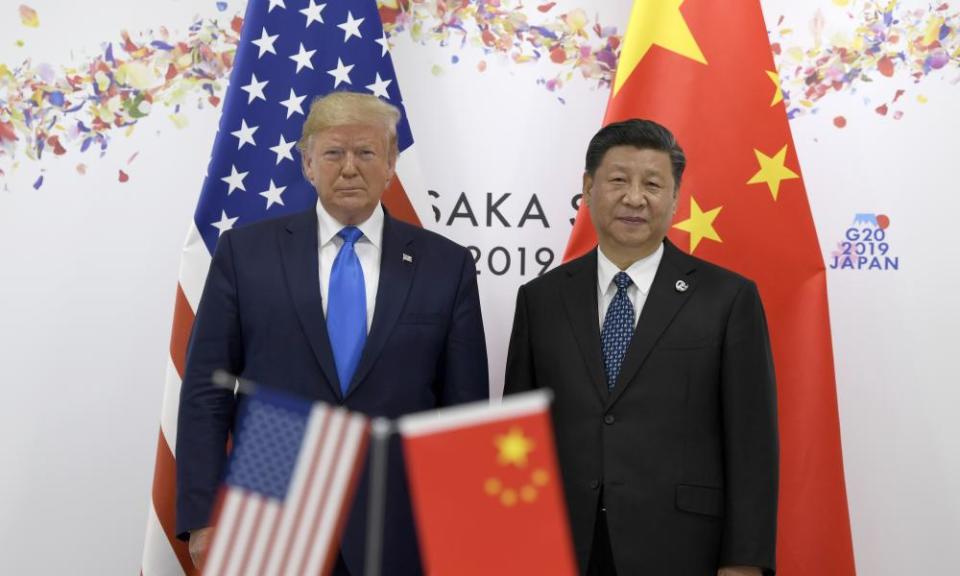Progressives can't leave criticism of China to the new cold warriors

In 2018, the Chinese government, under pressure from mounting evidence and United Nations scrutiny, changed its approach: it stopped denying the existence of internment camps in Xinjiang, and instead presented them as “vocational skills centres”, attended on a wholly voluntary basis by the region’s Uighurs, Kazakhs and other Muslims.
This threw up a number of questions: if the students were there voluntarily, why did a single classroom have five surveillance cameras? Why were they dressed in identical jumpsuits, and who volunteers to sit in a classroom chanting “I am a citizen who obeys laws and regulations” anyway? A researcher, Shawn Zhang, found what he believed to be satellite images of the same centre, which gave a clearer picture of its conditions: surrounded by razor wire and watchtowers. The following year, the so-called China cables were leaked, detailing the nature of this vocational programme – the top line, “allow no escapes”.
China’s actions are unforgivable, but one thing it can be forgiven for is not taking seriously the censure of foreign governments. While the Trump administration was considering sanctions, Donald Trump himself was guilty of detentions; migrant children were also being separated from their parents in the United States, some dying from neglected medical needs. The UK government, meanwhile, was charged by its own MPs with putting trade before human rights, Theresa May having declared a “golden era” for Anglo-Chinese relations. The current Conservative administration has conveniently forgotten events as recent as the past 18 months, and is claiming to have always strenuously decried China’s human rights abuses.
So we enter what has all the hallmarks of a new cold war with a global superpower, under leaders who have variously forfeited their own moral legitimacy, vacillated over decisions such as Huawei for secretive but guessable reasons and prioritised and deprioritised human rights as the mood took them, while simultaneously trying to weaponise a pandemic that really needs no geopolitical dimension to be a crisis in its own right. It’s enough to make a progressive quake, but just because Dominic Raab is using the plight of the Uighurs for his own sabre-rattling purposes doesn’t mean that plight is unimportant: it is central. There is no meaningful world order that doesn’t start at the prevention of genocide. We should take the concept of universalism, rather than capitalism versus communism, as the guiding principle in a forthcoming conflict that hopefully will remain cold but probably will not simply evaporate.
To think about what that would look like in concrete terms, we need to turn to the last cold war, which, at certain points, undid the left. Naturally unwilling to buy into an assumption of capitalist supremacy, many found it hard to condemn elements of communism that were plainly abhorrent. As superpowers fronted up to one another, the discursive space to say “You’re actually both wrong, in different ways, to different degrees, at different times, with different consequences” vanished, even though it was true.
The exception was the transnational peace movement, specifically the campaign for European nuclear disarmament, which achieved a number of things. First, by taking aim not at ideologies but at the arms race, it was able to build networks between grassroots movements. It didn’t have to erase or minimise anyone’s experience in order to hold an allegiance to one side or the other. This in turn created an alliance between peace and human rights movements across both blocs, which strengthened and extended the ambitions of both, so that what had previously been an argument based on necessity – if you can destroy the world with 10 nuclear weapons, why do you need 100? – became an argument based on rights: what right has any worldview to destroy lives, or even create the conditions for them to be destroyed? Lastly, of course, it achieved its aim: the end of the arms race, which itself signalled the end of the cold war.
That past doesn’t map neatly on to our present, but it does offer some guiding principles. The first is that universal human rights have to remain the ultimate goal. They cannot be up- and downgraded, according to the exigencies of trade or any other international agreement. The second is that any change to the Chinese modus operandi will not come about because a different superpower imposes it by force or sanctions, but from opposition within its own political ecosystem, of which the democracy movement in Hong Kong is the vanguard and not the extent; international manoeuvres must start with the humility of recognising that. Most importantly, none of us can scuttle away from a dire situation simply because we don’t trust our own leaders and their allies to be attacking it in good faith. One’s enemy’s enemy is, inconveniently, sometimes even worse.
• Zoe Williams is a Guardian columnist

 Yahoo Finance
Yahoo Finance 